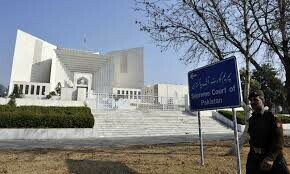ISLAMABAD: Living up to its commitment, the National Accountability Bureau (NAB) on Wednesday finally moved an appeal in the Supreme Court against the 2014 Lahore High Court verdict quashing the Rs1.2 billion Hudaibya corruption reference against the Sharif family.
“It is most respectfully prayed that leave to appeal may be granted to examine the legality, propriety and vires of the impugned judgement of March 11, 2014, passed by the LHC and consequently the said impugned judgement may graciously be set aside in the interest of justice, fair play and equity,” said the appeal filed by NAB Prosecutor General Waqas Qadeer Dar.
Former prime minister Nawaz Sharif, Punjab Chief Minister Shahbaz Sharif, Shamim Akhtar, mother of Nawaz, Shahbaz and the late Abbas Sharif, Maryam Safdar, Hussain Nawaz, Hamza Shahbaz, Hudaibya Papers Mills Ltd, the federal government as well as the judge of the accountability court No IV, Rawalpindi, are respondents in the appeal.
According to reference, Ishaq Dar helped in opening fictitious bank accounts used to launder money for Sharifs
NAB also filed an application seeking condonation of the delay in filing the appeal.
Legal observers believe that allowing of the appeal by the Supreme Court after hearing the matter will mean permitting the bureau to resurrect reference 5 of 2000 by reopening the same and filing it before the accountability court concerned.
In the reference, the respondents are accused of setting up Hudaibya Papers Mills Ltd to launder money by taking the cover of the Economic Reform Act, 1992. The money was laundered by converting the same into Foreign Exchange Bearer Certificates to be deposited in foreign currency accounts opened in the name of “benamidars” and friends by allegedly forging the signatures of some ostensible account holders.
These foreign currency accounts, according to the allegations, were then utilised by the Sharifs as collateral for obtaining credit lines in the Pakistani rupee for the Hudaibya Papers Mills. The reference also said that Finance Minister Ishaq Dar had helped in opening a number of fictitious bank accounts and carrying out a number of other illegal activities to achieve the objectives for their own benefit.
Assurance to court
On Sept 15, the NAB prosecutor general had assured the Supreme Court that the appeal against the high court verdict would be filed in the apex court within the next seven days.
Consequently, a five-judge SC bench headed by Justice Asif Saeed Khosa had disposed of the petition of Awami Muslim League chief Sheikh Rashid Ahmed that had invited the attention of the apex court to the failure of the bureau to file the appeal.
Sheikh Rashid had preferred instituting the petition in view of an earlier assurance held out by NAB’s Additional Prosecutor General Akbar Tarar on July 21 before a three-judge Supreme Court implementation bench headed by Justice Ejaz Afzal Khan that since the Joint Investigation Team (JIT) during its 60-day inquiry had collected additional and fresh evidence against the Sharifs for amassing assets disproportionate to their known sources of income, NAB was considering filing an appeal before in Supreme Court.
Reference quashed
The high court had on Dec 3, 2012, quashed the reference through a unanimous judgement, but the judges disagreed with each other over permissibility of reinvestigation by NAB in the matter.
This necessitated referring the same to a referee judge who held on March 11, 2014, that reinvestigation of the case was not permissible because it would mean providing NAB another opportunity ostensibly to fill up their lacunas and equip them with better tools for combating or victimising the Sharifs at the hands of the NAB authorities, which obviously was not the intent and purport of the NAO.
In the appeal, NAB argued that high court verdict was not passed in consonance with the dictums laid down by the apex court. Besides, it added, the referee judge was not competent to set aside the findings of the high court judge in the matter of reinvestigation as has been done in the instant case.
The investigation into the corruption allegation was a continued process to reach a just conclusion and any embargo cannot be placed on the fresh investigations or further investigation, especially when new material had emerged, the appeal argued.
NAB could not be debarred or restrained from proceeding further when the JIT had collected incriminating material in the Hudaibya case, the appeal said, adding that it would be appropriate to set aside the high court judgement to the extent of reinvestigation in order to fortify and corroborate the material collected by the JIT.
Due to subsequent availability of fresh material produced by the JIT before the Supreme Court, NAB could not be blocked from fulfilling its legal obligations, the appeal contended, adding that the high court judgement was void ab initio and illegal and as such no limitation ran against such void order.
Published in Dawn, September 21st, 2017
















































Dear visitor, the comments section is undergoing an overhaul and will return soon.